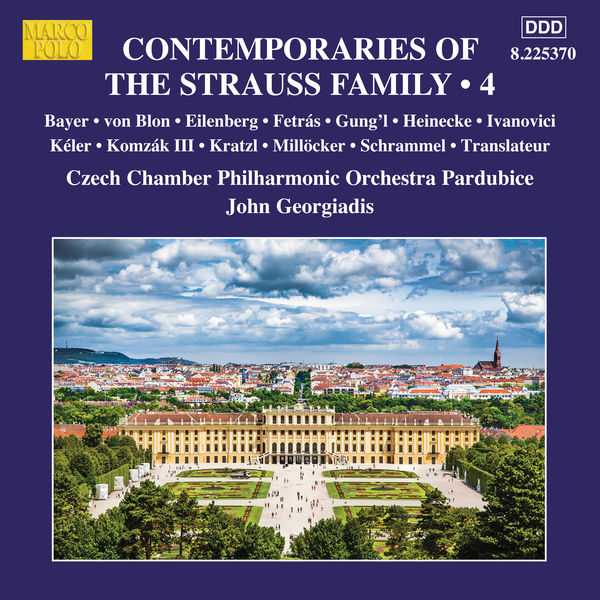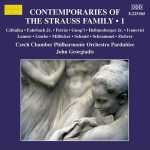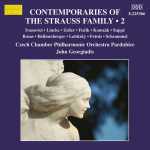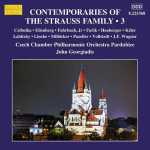
Orchestra: Czech Chamber Philharmonic Orchestra, Pardubice
Conductor: John Georgiadis
Format: FLAC (tracks)
Label: Marco Polo
Catalogue: 8225370
Release: 2019
Size: 385 MB
Recovery: +3%
Scan: yes
01. Fetras: Juchhei Tirolerbub!, Tyrolean March, Op. 195
02. Schrammel: In Wiener Dialekt
03. Translateur: Diabolo
04. Blon: Mein Ideal, Waltz
05. Bayer: Deutschmeister Regiments, March
06. Kratzl: Die letzte Tropfen, Waltz, Op. 500
07. Eilenberg: Die Wachtparade kommt, Quadrille, Op. 78
08. Millöcker: Mein Jugend Waltz
09. Kéler: Sempre Crescendo Galop, Op. 119
10. Komzák III: In der Zaubernacht, Waltz, Op. 308 (arr. J. Georgiadis for orchestra)
11. Heinecke: Adlon Marsch
12. Gung’l: Pandekten Walzer, Op. 226
13. Ivanovici: Céline, Polka Mazurka, Op. 130
14. Kéler: Vom Rhein zur Donau, Waltz, Op. 138
More lost gems are unearthed in this fourth volume of music by contemporaries of the Strauss family. This programme takes us from rousing gallops and polkas to gentler salon pieces and waltzes, including music from the era of the fateful Titanic and the changing tastes of the 1920s. It includes orchestral premieres and reconstructions from scant sources, representing a vivid cross section of popular music from a century and more ago. Some of these composers have already been represented in previous volumes, but some will be entirely new even to enthusiasts of this musical period. So much material was destroyed during the two world wars that we are fortunate to have much of this music at all, but it is also thanks to dedicated research and conductor John Georgiadis’ reconstructions that it all sounds so freshly minted in this excellent recording.
For most listeners, the world of Viennese light music begins with the Strauss family and perhaps a few one-hit wonders otherwise. However, the waltz, polka, march, galop, and so on, were the popular music currency of the day, across a vast empire with millions of inhabitants. The music of Vienna, which was really a mixture of music from across the Austro-Hungarian Empire and beyond, included dozens or hundreds of composers, many of whom were very prolific; several works here have opus numbers in the hundreds. The works on this recording were written between the 1890s and the late 1920s, and if there isn’t another Johann Strauss II, there are plenty of imaginative and engaging treatments. Sample Die Wachtparade kommt, Op. 78, by the all-but-unknown Richard Eilenberg, which, like the Fourth of July section of Charles Ives’ Holidays Symphony, puts the listener in the place of a parade watcher who is hearing marching bands approach. Along the way, you will get to know such composers as Siegfried Translateur, who died in a Nazi concentration camp, and Karl Kratzl, who died of an insect bite. Much of this music was lost due to World War II bombs or simple neglect, and its resurrection has been, in many cases, the result of work by conductor and Strauss enthusiast John Georgiadis; Georgiadis arranged two pieces heard here from piano scores. Conducting the Czech Chamber Philharmonic, Pardubice, Georgiadis lets the musicians impart some fun and rhythmic zip to the music, which is all to the good. There isn’t a dull work among the bunch, and for anyone who likes Strauss, this is an enjoyable 80 minutes. For those interested in European popular culture of the early 20th century, it’s essential.



